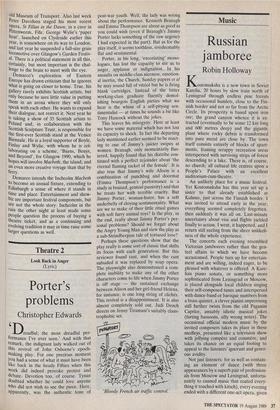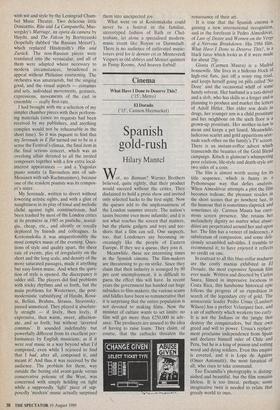Music
Russian jamboree
Robin Holloway
Kostomuksha is a new town in Soviet Karelia, 20 hours by slow train north of
Leningrad through endless pine forests with occasional hamlets, close to the Fin- nish border and not so far from the Arctic Circle. Its prosperity is based upon iron ore; the grand canyon whence it is ex- tracted (eventually to be some 12 km long and 600 metres deep) and the gigantic plant where rocky debris is transformed into pure metal are close by. The town itself consists entirely of blocks of apart- ments, framing scrappy recreation areas interspersed with surviving strips of forest descending to a lake. There is, of course, no church; all cultural life centres upon a People's Palace with an excellent auditorium-cum-theatre.
An unlikely place for a music festival. Yet Kostomuksha has this year set up a sister to that already established at Kuhmo, just across the Finnish border. I was invited to attend early in the year; everything seemed completely forgotten, then suddenly it was all on. Last-minute uncertainty about visa and flights yielded finally to action. I went, it happened, and I return still reeling from the sheer unlikeli- ness of the whole experience.
The concerts each evening resembled Victorian jamborees rather than the gen- teel affairs to which we have become accustomed. People turn up for entertain- ment and are willing, indeed eager, to be pleased with whatever is offered. A Kare- lian piano sonata, or something more sophisticated from Leningrad or Moscow, is placed alongside local children singing their self-composed tunes and interspersed with dance-band or baroque numbers from a brass quintet, a clever pianist improvising still further twists from the old Paganini Caprice, amiably idiotic musical jokes (farting bassoons, silly wrong notes). The occasional official modern music by the invited composers takes its place in these medleys, presented like a television show with jollying compere and commere, and takes its chance on an equal footing to appeal to the listeners' ignorant and gener- ous avidity.
Not just listeners: for as well as contain- ing an element of dance (with three appearances by a superb pair of profession- als from Moscow and Leningrad, unfortu- nately to canned music that coated every- thing it touched with kitsch), every evening ended with a different one-act opera, given
with wit and style by the Leningrad Cham- ber Music Theatre. Two delicious little Donizettis, Rita and La Campanella, Mus- sorgsky's Marriage, an opera da camera by Haydn, and The Falcon by Bortnyanski (hopefully dubbed 'the Russian Mozart'), which replaced Hindemith's Hin and Zurtick. The non-Russian pieces were translated into the vernacular, and all of them were adapted where necessary to modern circumstances, broadened in appeal without Philistine coarsening. The orchestra was amateurish, but the singing good, and the visual aspects — costumes and sets, individual movements, gestures, expressions, movements of the cast in ensemble — really first-rate.
I had brought with me a selection of my simpler chamber pieces with their perform- ing materials (since no requests had been received by my publishers, and anything complex would not be rehearsable in the short time). So it was piquant to find that my Serenade in E flat turned out to be in a sense the Festival's climax, the final item in the final serious concert, which was an overlong affair devoted to all the invited composers together with a few extra local- interest appearances — and a Yugoslav piano sonata (a flavourless mix of sub- Messiaen with sub-Rachmaninov), because one of the resident pianists was its compos- er's sister.
My Serenade, written to divert without lowering artistic sights, and with a glint of naughtiness in its play of tonal and melodic cliché against tight constructivism, had been trashed by most of the London critics at its premiere in 1985 as pastiche, nostal- gia, cheap, etc., and silently or vocally deplored by friends and colleagues. In Kostomuksha it was unquestionably the most complex music of the evening. Ques- tions of style and quality apart, the sheer rate of events, play of irregularity on the short and the long scale, and density of the more saturated passages, made it anything but easy-listen music. And when the ques- tion of style is opened, the discrepancy is odder still. The players did find problems with tricky rhythms and so forth, but the main problems for Westerners, the post- modernistic `cubistifying' of Haydn, Rossi- ni, Bellini, Brahms, Strauss, Stravinsky, passed unnoticed. They played it absolute- ly straight — if lively, then lively, if expressive, then warm, sweet, affection- ate, and so forth; but without 'inverted commas'. It sounded indefinably but powerfully different from its excellent per- formances by English musicians; as if it were real music in a way beyond what I'd composed, even while I rejoiced to find that I had, after all, composed it, and meant it! And thus it was received by the audience. The problem for them, way outside the boring old avant-garde versus conservative polemic of the West, was concerned with simply holding on tight while a supposedly 'light' piece of sup- posedly 'modern' music actually surprised them into unexpected joy.
What went on at Kostomuksha could never be a festival in the familiar, stereotyped fashion of Bath or Chel- tenham, let alone a specialised modern- music event like Royan or Darmstadt. There is no audience of cultivated music- lovers avid for le dernier cri or Monteverdi Vespers in old abbeys and Mozart quintets in Pump Rooms. And heaven forbid!



















































 Previous page
Previous page